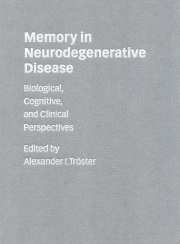Book contents
- Frontmatter
- Contents
- List of contributors
- Preface
- PART I Biological perspectives
- PART II Cognitive perspectives
- PART III Clinical perspectives
- 14 Biological and psychosocial risk factors for dementia and memory loss
- 15 Cross-cultural issues in the neuropsychological assessment of neurodegenerative disease
- 16 Psychometric issues in the clinical assessment of memory in aging and neurodegenerative disease
- 17 The role of memory assessment in the preclinical detection of dementia
- 18 Clinical differentiation of memory disorders in neurodegenerative disease
- 19 The impact of depression on memory in neurodegenerative disease
- 20 Preserved cognitive skills in neurodegenerative disease
- 21 Drug treatment of cognitive impairment in neurodegenerative disease: rationale, current experience and expectations for the future
- 22 Surgical interventions in neurodegenerative disease: impact on memory and cognition
- 23 Memory dysfunction in neurodegenerative disease: ethical and legal issues
- 24 Memory in neurodegenerative disease: clinical perspectives
- Index
24 - Memory in neurodegenerative disease: clinical perspectives
from PART III - Clinical perspectives
Published online by Cambridge University Press: 23 November 2009
- Frontmatter
- Contents
- List of contributors
- Preface
- PART I Biological perspectives
- PART II Cognitive perspectives
- PART III Clinical perspectives
- 14 Biological and psychosocial risk factors for dementia and memory loss
- 15 Cross-cultural issues in the neuropsychological assessment of neurodegenerative disease
- 16 Psychometric issues in the clinical assessment of memory in aging and neurodegenerative disease
- 17 The role of memory assessment in the preclinical detection of dementia
- 18 Clinical differentiation of memory disorders in neurodegenerative disease
- 19 The impact of depression on memory in neurodegenerative disease
- 20 Preserved cognitive skills in neurodegenerative disease
- 21 Drug treatment of cognitive impairment in neurodegenerative disease: rationale, current experience and expectations for the future
- 22 Surgical interventions in neurodegenerative disease: impact on memory and cognition
- 23 Memory dysfunction in neurodegenerative disease: ethical and legal issues
- 24 Memory in neurodegenerative disease: clinical perspectives
- Index
Summary
INTRODUCTION
Impairment of memory is the hallmark and often among the first symptoms of the majority of neurodegenerative diseases. Thus, knowledge regarding memory and its deficits has become of major interest to individuals who are confronted with a person developing dementia, be it as medical staff, research personnel or, in a more social and immediate fashion, as a family member or caregiver. As evident in this book, there are several approaches to study the structure and impairments of memory. The biological perspective focuses on the brain as the host of memory; the cognitive perspective describes the varieties of memory and its pathology and the clinical perspective is concerned with the effects of neurodegenerative disorders on the brain, on memory functions and with their consequences for the patient. Among these three approaches, clinical memory research is the most pragmatic. Naturally, it is also the least homogeneous because it encompasses a number of domains such as research on normal aging, clinical investigations, neuropsychological assessment methods, pathology, treatment and epidemiology. Thus, despite the advantage it is afforded by being able to make use of theoretical frameworks emanating from experimental work, a high percentage of clinical questions remains unanswered. In the clinical perspectives section of this volume, some important issues regarding clinical memory research in dementia are updated, reviewed and discussed. The result is a state-of-the-art summary of the clinical research into dementia-related memory impairment; however, due to their critical modus operandi, the chapters in this section have also become a register of unanswered questions and research topics which need to be tackled in the future.
- Type
- Chapter
- Information
- Memory in Neurodegenerative DiseaseBiological, Cognitive, and Clinical Perspectives, pp. 390 - 399Publisher: Cambridge University PressPrint publication year: 1998



